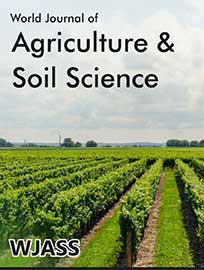 Research Article
Research Article
Suitability Evaluation of Urban Soils underline by Asu River Parent Material forCassava Manihotesculenta and Bambara groundnut (Vignasubterranea (L.) Verdc) Production in Ebonyi, Southeastern Nigeria
Chris-Emenyonu*, Onweremadu EU, Njoku JD and Ahukaemere CM
Department of Soil Science and Technology, Federal University of Technology, Nigeria
Chris-Emenyonu, Department of Soil Science and Technology, Federal University of Technology, Nigeria.
Received Date: April 27, 2020; Published Date: May 11, 2020
Abstract
Cassava and Bambara groundnut are commonly consumed crops in Nigeria. Cassava is a tuber crop of utmost importance in Nigeria and increasing the production of cassava will enhance food security because cassava is consumed widely in Nigeria and Bambara groundnut is the third most important legume after groundnut (Arachishypogaea) and cowpea (Vignaunguiculata) in Africa. Soil suitability evaluation of some urban soils derived from Asu river group in Ebonyi rainforest agroecological zone of South eastern Nigeria was undertaken to define the fitness of the soil for production of River for Cassava (Manihotesculenta and Bambara groundnut (Vignasubterranea (L.) Verdc). The FAO guideline for land evaluation was used. Results obtained showed that sand content ranged from 481.85 – 669.6 g kg-1, silt content ranged from 192.8 – 330.27 g kg-1 while clay content ranged from 137.6-258.35 g kg-1. Bulk density ranged from 1.43- 1.44 gcm-3 and textural class ranged from sandyloam to sandy clay loam. PH varied from very strongly acidic (4.37) to moderately acidic (5.79). Organic matter ranged from 5.08-7.94 g kg-1. Soils were low in available phosphorus with values ranging from 7.60-10.34 g kg-1 and total nitrogen ranged from 0.30 to 0.85 g kg-1. Suitability evaluation showed that all the sites studied were currently not suitable (N1) for cassava production when the pH requirement for cassava was matched with pH of the study area. These urban soils were also currently not suitable (N1) for Bambara groundnut production due to limitation of rainfall and total nitrogen. Therefore, this study recommends liming of soil of the study area to encourage cultivation and promote sustainable cassava production and in the cassava of bambara groundnut, since rainfall of the area is not suitable for its production, there is no need to embark on its cultivation except in alternative irrigation pattern is to be used.
Keywords: Urban soil; Cassava; Suitability Evaluation; Food security; Nigeria
-
Chris-Emenyonu, Onweremadu EU, Njoku JD, Suitability Evaluation of Urban Soils underline by Asu River Parent Material forCassava (Manihotesculenta and Bambara groundnut (Vignasubterranea (L.) Verdc) Production in Ebonyi, Southeastern Nigeria. World J Agri & Soil Sci. 4(5): 2020. WJASS.MS.ID.000599.
-

This work is licensed under a Creative Commons Attribution-NonCommercial 4.0 International License.






